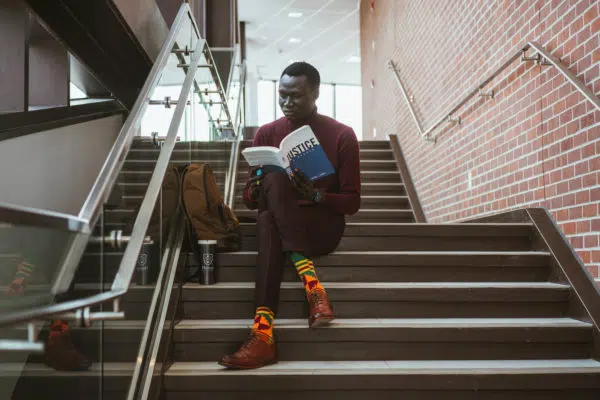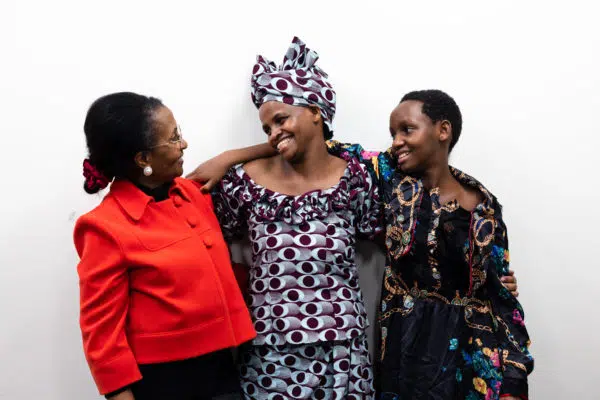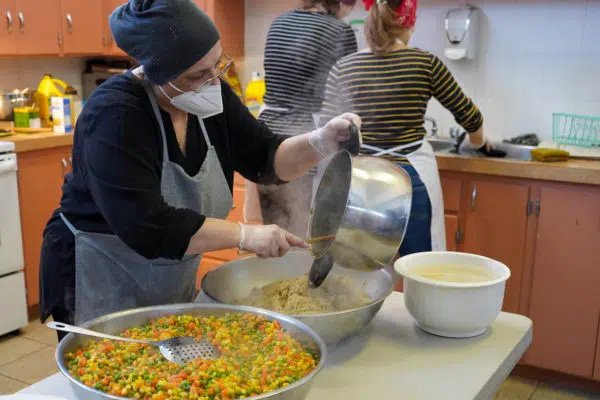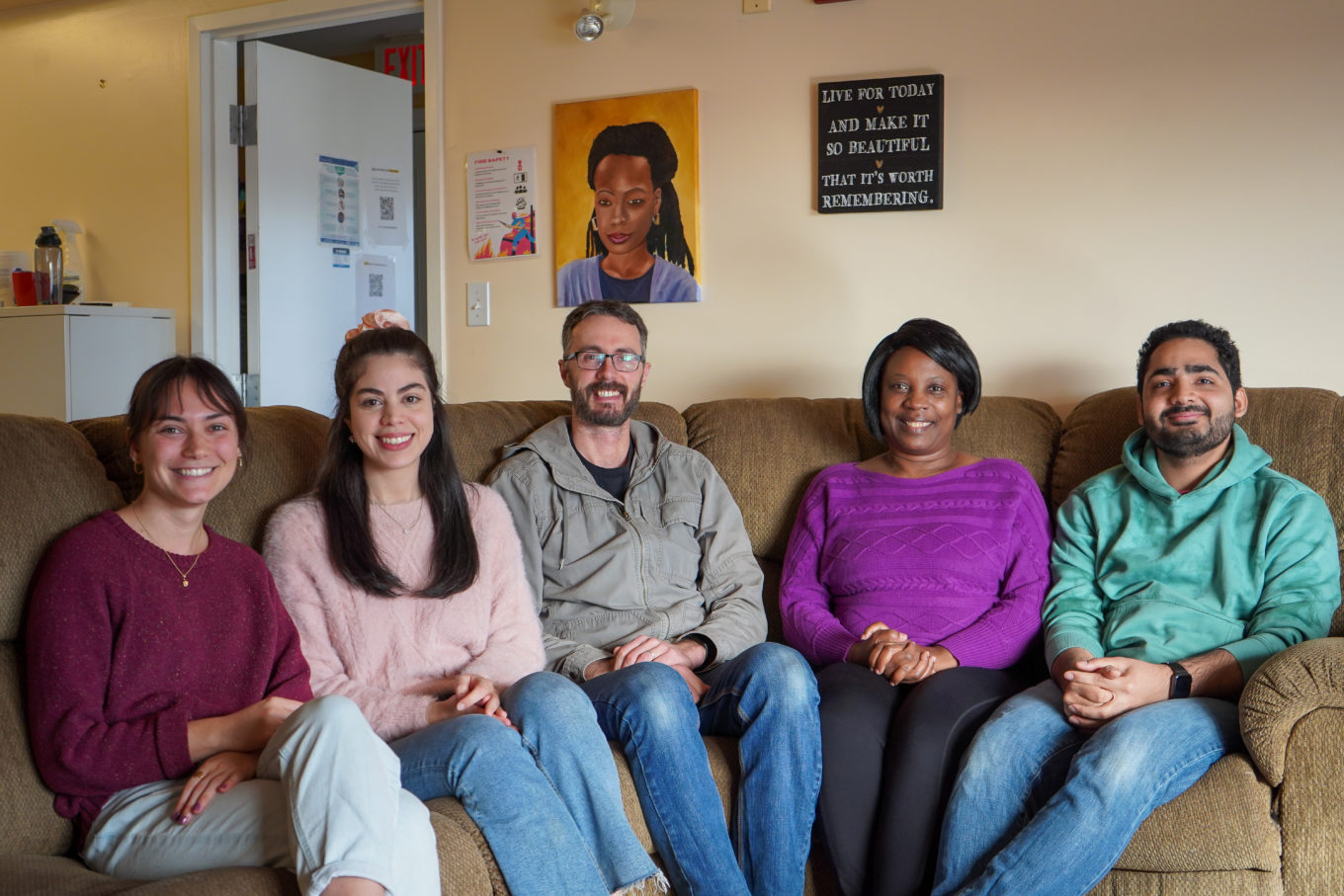
The team at Matthew House Ottawa gathers for a group photo. Left to right: Brynn, Bre, Allan, Doreen and Abdul. ©️ UNHCR / Soo-Jung Kim
Finding the meaning of home while on a journey in search of safety and refuge
By Soo-Jung Kim
On a bright December afternoon, the burgundy front door swings open. A few hours earlier, a group of volunteers had dropped by, armed with a wreath in hand, to decorate the entrance for the holiday season.
There are peals of laughter echoing through the hallways, bouncing off the four walls that many newcomers now call home. The space is warm and inviting, full of life and buzzing with activity. Sunlight filters through the kitchen window.
If you had asked Doreen and Abdul a couple of years earlier if they could have imagined finding themselves where they are now, standing in the living room at one of Matthew House’s reception homes, working in Refugee Services, their answer would have been no.
They were happy where they were. They worked hard to build a life for themselves. But here they are today, thousands of kilometres from the place they once called home.
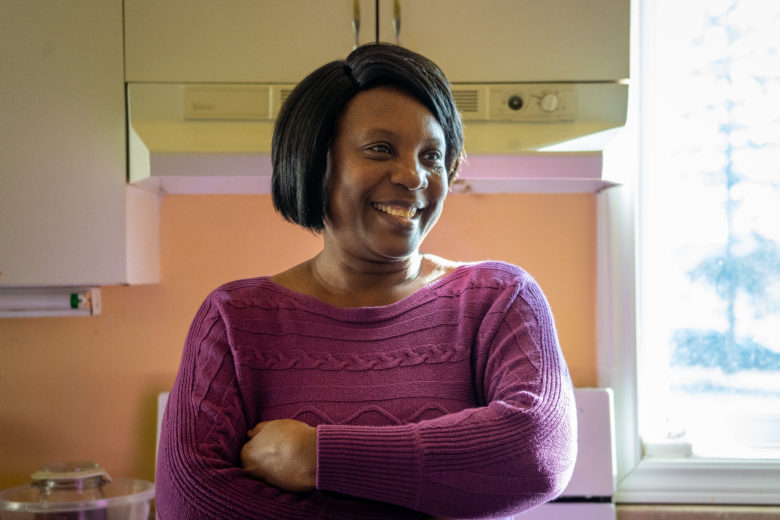
Doreen smiles as she chats with one of the residents. © UNHCR / Soo-Jung Kim
Finding a new home in Ottawa
Born and raised in Uganda, Doreen grew up in a big family with seven siblings. Education was important to her. She spent her life in pursuit of knowledge, with her first degree in sociology and went on to obtain her Master’s in the Netherlands.
Her career spanned an impressive breadth of experiences, from teaching at universities and working as a social worker, to becoming the National Coordinator for Disaster Management and Refugees on behalf of UNDP in Uganda.
She had instilled the same pursuit of higher education in her children. When the time came, her son decided to continue schooling in Canada as an international student. She accompanied him on his travel.
“I had to run for it. It was not an easy decision to make… But being alive was the most important thing, irrespective of whatever happened.”
But during her trip to Canada, the situation back home suddenly deteriorated. “I realized it was no longer safe for me to go back home,” Doreen said. “I had to run for it. It was not an easy decision to make. To leave behind everything I had worked hard for all my life. But being alive was the most important thing, irrespective of whatever happened.”
Doreen had not anticipated staying. She only brought the essentials in her luggage, expecting her trip to last only ten days. She says, “Because of the issues I was running away from, I had no access to money.”
She found herself homeless.
It was her friends in Vancouver that connected her to a community with the Ugandan church in Ottawa. They offered her a place to stay and supported her through the process of making a refugee claim in Canada.
Doreen had been so grateful for their kindness and support, she knew she wanted to continue giving back to the community that accepted her with open arms. A conversation with the pastor led her to discover Matthew House, where she spent her days volunteering, three months after arriving in Canada.
“In the process of volunteering, I met other refugee claimants,” she says. “I was so happy. And my life became happier because I could see other people like me who had the same needs or are going through the same process. I could resonate with their stories.”
The organization is, “a place where residents come in and find other people like them,” she says. “They become a family and live within a community,” Doreen adds. “It’s a one-stop center where we give our residents safety and help them through the refugee claim process and the newcomer integration process.”
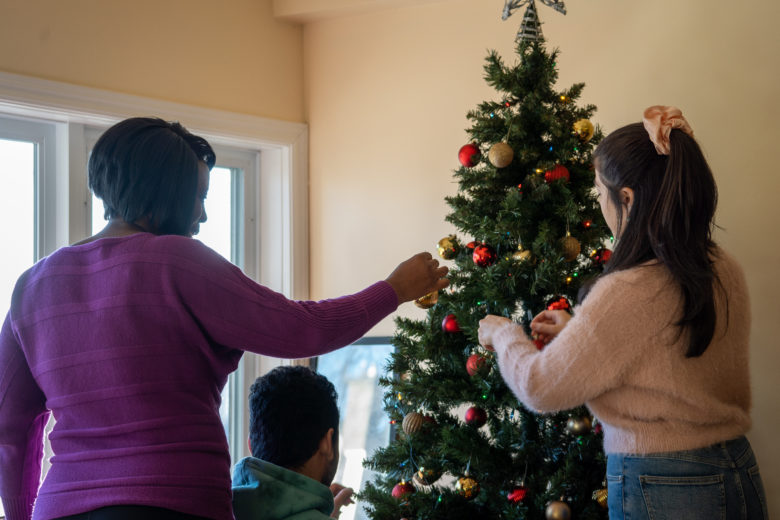
Doreen, Abdul and Bre (left to right) decorate the Christmas tree for the residents. © UNHCR / Soo-Jung Kim
Today, she works as Matthew House’s Program Manager in Refugee Services.
“Everyone wants to be independent. No one wants to be in a shelter forever,” she says. “Then they go to work, move out and create a bed for someone else to come in.”
“When you see people who came last year… and their life is moving forward, it’s really rewarding.”
Her favourite part of her work?
“You see people’s lives change. That keeps us going,” Doreen says. “When you see individuals who came in last year, they are all on their feet, they are permanent residents, they are getting married, and their life is moving forward, it’s really rewarding.”
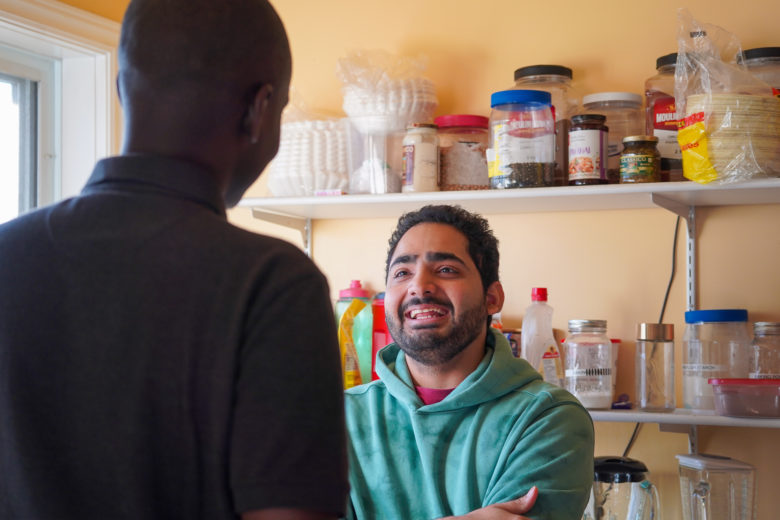
Abdul catches up with one of the residents. © UNHCR / Soo-Jung Kim
From Yemen to the US to Canada
Abdul’s plan was to return to Yemen and help contribute to his home country after completing his industrial engineering degree in the United States. He left for Pennsylvania on scholarship in 2014, the year his country descended into civil unrest.
“It’s ironic,” he says. “When I left, things just went downhill. The entire situation was completely unsafe, and it was getting worse and worse. It got to a point where I wouldn’t even check the news anymore because it gets so depressing.”
“I know I couldn’t go back home. I wasn’t sure what to do because I was terrified.”
When it came time for him to graduate in 2019, he had a difficult choice ahead of him.
“I know I couldn’t go back home,” Abdul recalls. “I wasn’t sure what to do because I was terrified. [I ended up asking my brother if I could come over] because he was already working here in Canada.”
Once landed, he describes the refugee claim process as overwhelming.
“There are so many papers, documents, and applications that I had to go over. Thankfully my brother was living in Ottawa, so I stayed at his place. It was one less thing to worry about, but there are so many people that do not have the privilege that I had.”
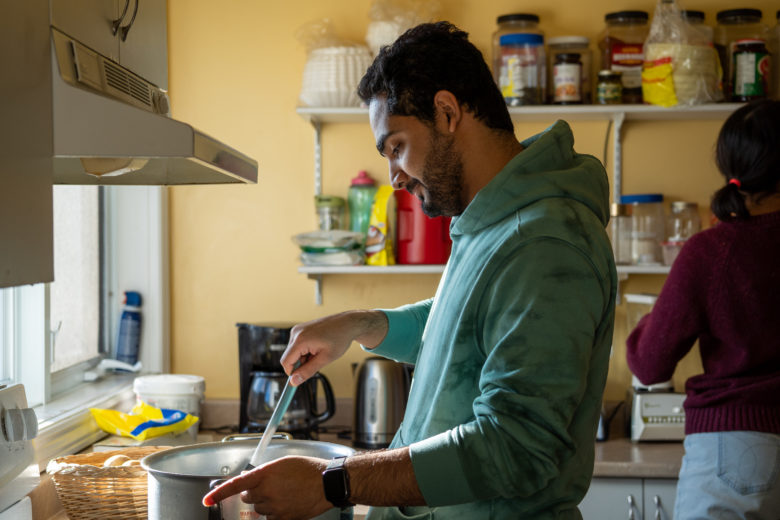
Abdul prepares a meal for the residents and volunteers. Volunteering to cook is another way to get involved with Matthew House Ottawa. © UNHCR / Soo-Jung Kim
Once Abdul received his work permit, he spent his days applying for jobs online. He accepted the first job he could find: working as an inventory assistant.
“It wasn’t engineering… and it wasn’t my favourite job,” he says. “But the main goal was to get out of the house because being a refugee claimant can be very depressing. It’s not just the limbo of waiting for the case, but [in my situation] I know Yemen is not doing well. Every time I see a call from back home, I hope no one has died… but there’s just so many people that did that I lost count.”
Once the pandemic hit, like many Canadians, Abdul lost his job. A couple of months later, he found a position with Matthew House Furniture Bank as an Operations Intern.
“When I got there for the interview, the first word I saw was welcome.”
He remembers that day clearly, etched vividly in his memory. “When I got there for the interview, the first word I saw was welcome.”
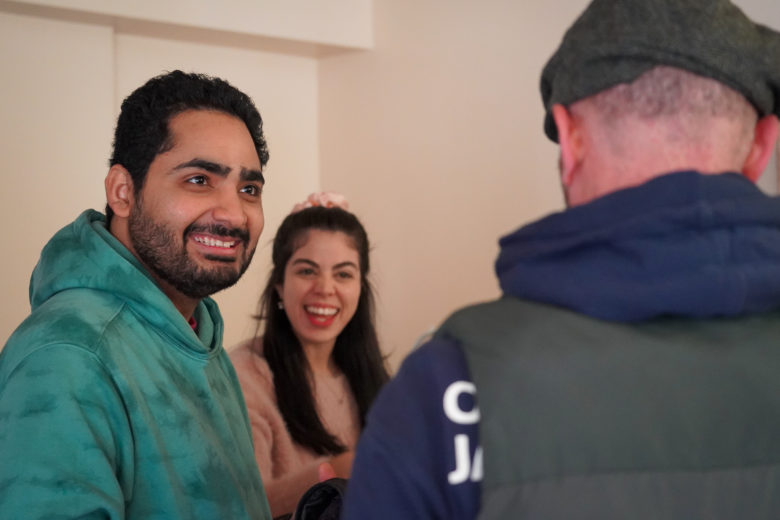
Abdul and Bre distribute donated winter clothing and shoes to the residents. © UNHCR / Soo-Jung Kim
After two months of his internship, he was offered a full-time position — a moment he reminisces fondly as the beginning of it all. “It was really good coming to Refugee Services because while I could never imagine what their stories are, I felt like I could relate. I have been there. It felt right.”
A path forward
When asked about one piece of advice for newcomers, it was this.
“Safety is the first thing. When you feel safe, then you can rebuild your life. Locate support centers around you. The other important thing is to network. Find a community where you feel loved and that you belong. [Find where you feel at home,]” says Doreen.
“Being a refugee is not something somebody chooses.”
In hopes for the future, she adds, “I would like to see more people not judge refugee claimants because sometimes people feel they shouldn’t be coming and that they are a drain on taxpayers. But by investing in giving people safety, in return, they give their life to the country.”
“Being a refugee is not something somebody chooses. No one wants to be a refugee. We are here because we have nowhere to go back to.”
***
Since its establishment in 2010, Matthew House Ottawa’s Refugee Services program has served the critical needs of nearly 400 refugee claimants from more than 50 countries. Residents are provided a bed and food in a safe, family atmosphere for up to 6 months. Their work includes wrap-around support for settlement assistance, including navigating the refugee claim process, securing a work permit, and finding a job and a home.
To find out more about their work or get involved, click here.



